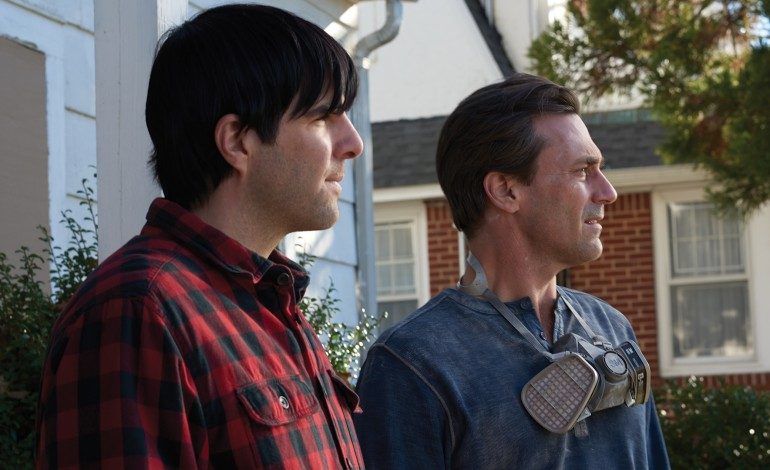

In Brian Shoaf’s Aardvark, Jenny Slate, Zachary Quinto, and Jon Hamm each plays a lost soul in search of spiritual repair. Quinto plays Josh, a psychologically fragile man who hires Emily, a lonely therapist played by Jenny Slate, when he finds out his estranged brother, Craig comes to town. Things become further complicated when Craig, played by John Hamm, starts sleeping with Emily. At a glance, Aardvark has the makings of a quiet, introspective comedy. The only issue is that Aardvark isn’t very interested in being funny.
Zachary Quinto gives an admirable performance as Josh, painting a portrait of mental illness that never feels diminutive. As Josh stops taking his medication, the scope of his psychosis becomes evident as he begins hallucinating different characters – a homeless woman, a police officer, in Josh’s mind, they’re all just amazing performances by his brother Craig, who has become both an unbearable presence and absence in his life.
Josh proves an overwhelming patient for Emily, whose relationship with Craig only complicates things. Craig is back in town to handle the sale of their childhood home and is trying to get it all done without seeing Josh, which doesn’t sit right with Emily. Things slowly come to a head as Josh stops taking his medication and drops into a self-destructive spiral. It’s a compassionate portrayal of mental illness, if not a particularly original one. The film employs the standard schizophrenic ‘are they real or in his head’ trope, this time in the form of Hannah (Shiela Vand), a girl who visits the coffee shop Josh works at.
For a film that stars three actors with solid comedic chops, Aardvark is a surprisingly dour movie. While Jenny Slate imbues Emily with a unique emotional vulnerability, she never quite gets to flex her funny bone and the performance feels like a missed opportunity. Hamm also feels underused here. His years on Mad Men have made Hamm an expert at creating characters that are simultaneously repugnant and charismatically empathetic. His work here is quite good, although the film never gives his relationship with Slate the room it needs to grow into something that feels like more than a plot contrivance.
Aardvark is a film that touches on a number of interesting points, but they never coalesce into anything that feels substantive. Shoaf’s script seems keen to investigate how memory and self-perception affect interpersonal relationships, specifically Josh and Craig’s tumultuous past. While the notion that our relationships are based on memories of events that can be remembered differently is a fascinating concept, Shoaf’s film simply doesn’t allocate itself the time to investigate the idea.
This is a running theme in Aardvark. It’s a film that touches on a lot of very interesting ideas and starts down a number of compelling narrative plot lines, but one by one they’re cut short, or abandoned, leaving the film feeling like a missed opportunity.
Verdict: 2 out of 5
There’s a lot to admire about Aardvark. The individual pieces are all compelling and often well executed, and the three leads give solid performances. But the film never delivers on its potential. There’s a frustrating lack of follow through in Shoaf’s script, which builds the film out of a series of false starts. The three lead performances are all admirable, but they feel like they’re starring in different movies. Aardvark never quite figures out which direction it wants to go and ends up standing at a crossroads taking tentative steps in each direction. There are interesting moments to be found here, sure, but no one is doing their best work.
